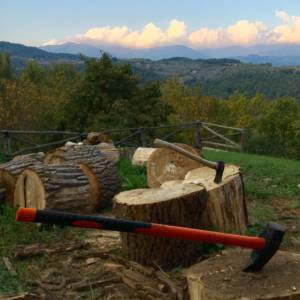The Chains
'Chains' - catene - in Italian construction parlance are steel reinforcing rods driven through the house to hold the walls together in case of an earthquake.
The engineer reckons on two parallel chains along the two internal crossing walls at 25mm thick apiece. Here some of the guys are working out how long the chains will needs to be taking into account wall thicknesses and the joiners in the middle of each chain. The guy who machines the chains - putting the left and right handed screw fittings on them - so they can be tightened - is known as il fabbro.
Later, as I was finishing cleaning up those bloody steps, I got talking to R who has lived in the area all his 69 years. He was saying that the steep stone track over which the steps are now built would have not been for wheeled traffic but a donkey- or mule-pulled treggia - a sledge of sorts. A sort of pre-mechanical precursor to the tracked tractor favoured by many on Tuscany's ridiculously steep and hilly land. The terraces are known as mannege in Casentino and some are now prized as local historical and topographical artefacts. We have a fair few.
Back in the 60s Strada still used to be full of parked donkeys that were used by the local mountain people to take back their purchases from the Monday market. Now it is full of all sorts of 'Jeepetti' - little Jeeps.
Back then there were very few metalled roads but mainly just mule and donkey tracks.
The caretaker of R's school was one of those who eventually got a car- even though he couldn't drive as such. The kids at the school got a large piece of cardboard and put it on his windscreen. It said, 'Remember to take the handbrake off.'
A snowy ride back up the Consuma with the temp hovering just above freezing.
Couple more things: I saw my first genuine Tuscan scorpion yesterday cleaning those steps.
And talking to the guy down in the agri shop I learned that the best-loved seed potatoto in this little area is a Belgian-grown Canabeque (?) - a white fleshed potato that is not over-prolific but that resists drought well. Scottish seed potatoes will be arriving soon - amongst them Desiree - which is also favoured. Blight is called 'la bruccia' - the burn - and can occur.
And noted with concern item on BBC radio about spread of Xylella fastidiosa bacteria that threatens oak and olive trees and now considered a big danger to British oak populations.
Mull people - see yesterday's entry if you didn't see the strange Mull connection.

Comments
Sign in or get an account to comment.


